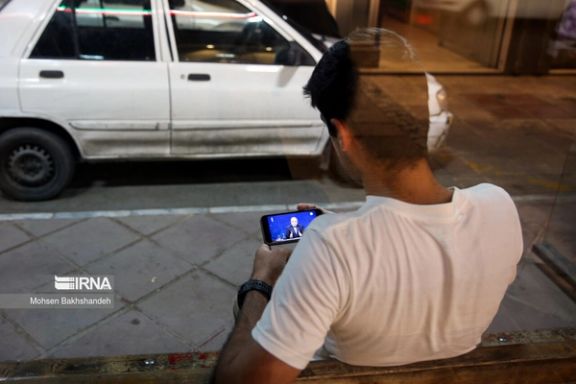Hijab, Internet Top Issues in Iran's Presidential Debate

The third round of Iran's presidential debates focused on cultural issues, with the government's treatment of women and internet restrictions being the main points of contention.

The third round of Iran's presidential debates focused on cultural issues, with the government's treatment of women and internet restrictions being the main points of contention.
Candidates took turns discussing the brutal crackdown on women defying the mandatory hijab, despite their own roles in intensifying the enforcement.
Mohammad-Bagher Ghalibaf, the current parliament speaker, Masoud Pezeshkian, a member of parliament, and Tehran mayor Alireza Zakani are all directly involved in the new regulations the Islamic Republic is crafting to maintain control over Iranian women's public appearance.
For the past 45 years, Iran's clerical rulers have imposed stringent Islamic laws, regulations, and punishments to control citizens' private lives.
A dress code, including mandatory hijab and unequal rights for women, religious indoctrination in schools, a ban on alcoholic beverages, and medieval punishments like flogging for minor offenses – all were imposed on a society rapidly modernizing before the 1979 revolution.
Many Iranians, particularly Generation Z, reject some or all of these religious rules defined by Iran's Shia clerics. This rejection fueled the nationwide anti-regime protests in September 2022, sparked by the death of a 22-year-old woman in police custody for "improper" hijab.
Iran’s Generation Z in particular mostly reject a religious state and seek a secular government that would allow them social freedoms, such as enjoying music and dancing.
The candidates' statements displayed an ambivalence. On the one hand, they defended women's autonomy in choosing their public attire. On the other hand, they defended the government's crackdown on those who defy the mandatory dress code.
Since the 2022 nationwide protests, harshly suppressed by security forces, enforcing the hijab has become a significant challenge. Women increasingly appear in public without it. The government has implemented various measures to enforce hijab, and the parliament and the Guardian Council are wrangling over a new law to penalize women who defy it. Punishments include using surveillance cameras to identify these women, blocking their bank accounts, and withholding services – tactics used for humiliation.
No candidate offered a clear solution for Iranian women who oppose the government's dress code. Founded in 1979, the Islamic Republic is the only Muslim-majority country besides Taliban-ruled Afghanistan with such a strict interpretation of hijab and nationwide coercive measures for its observance. This occurs despite Islam being the official religion in 26 countries across Asia, sub-Saharan Africa, North Africa, and the Middle East.
Internet restrictions were also a topic of debate. Some candidates criticized the blocking of hundreds of websites and popular social media platforms. However, most proposed developing a national intranet under state control.
Even Masoud Pezeshkian, the reformist-backed candidate, defended the government's "intervention" in internet access, justifying shutdowns during national crises. "When intervention is necessary in a specific crisis, I will intervene," he stated. The Islamic Republic has a history of cutting off the internet during nationwide protests.
Pezeshkian claimed that all countries intervene in internet access, a frequently repeated but inaccurate defense by Iranian officials. He further argued that use of VPNs by citizens facilitates access to "obscene" content.
The candidates also threw their weight behind the expansion of Iranian alternatives to international social media platforms and websites, with some of them mentioning specific brands that have been created in Iran as the country has blocked the access of people to the free internet.
In the face of such restrictions, most Iranians have started using VPNs (filter breakers) to access the global internet, leading to the creating of a huge market for such services.
Mustafa Pourmohammadi said during the debate that the financial turnover of VPNs is 50% of the financial turnover of cyberspace in Iran.
There are no precise statistics on the financial turnover of VPNs in Iran. The latest estimates are between 200 and 300 trillion rials per year (about $500 million).
Pourmohammadi, like several other candidates, has been pledging to remove the country’s restrictions on the internet but such restrictions are not under the control of the president. Earlier in the day, Iran's Minister of Information and Communications Technology refuted presidential candidates' promises to lift internet censorship, stating that the president does not have the authority to make that decision.